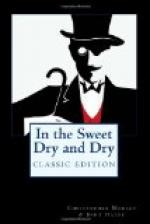“What a heavenly spot!” cried Theodolinda, “I wonder where we are?”
“Somewhere in New Jersey,” said her husband. “I don’t understand what was the matter with the air. It didn’t act according to Hoyle.”
They gazed about them in some surprise at the opulent beauty of the scene. It seemed to be a kind of park, laid out in lawns, gardens and shrubbery, with groves of old trees here and there. A little artificial lake twinkled in a hollow.
They happened to be gazing upward when a small round ball of tawny color fell from the tree. It was a robin. Folded solidly for sleep, he fell unresisting by the flutter of a wing, turning over and over gently until he struck the turf with the tiniest of soft thuds. He bounced slightly, rolled a little distance, and settled motionless in the grass.
Quimbleton, amazed, stooped over the fallen bird, supposing it to be dead. Without lifting it from the ground he withdrew its head from under its wing. The bright eye unlidded and gazed at him sleepily. Then the bird closed its eye with a certain weary resignation, put its head back under its wing, and relaxed comfortably in the grass.
Quimbleton was no very acute student of nature, but this seemed very odd to him. And then, examining the lower limbs of the tree, he uttered an exclamation. He swung himself up into the oak and shook one of the branches. Five other birds plopped comfortably into the grass and rested as easily as the first. He examined them one by one. They were all sound asleep.
“Most amazing!” he said. “My dear, we will have to take up nature study. I am really ashamed of my ignorance. I always thought that owls were the only birds that slept by day.”
Theodolinda was looking at the five small bodies. She raised one of them gently, and sniffed gingerly.
“Virgil,” she said solemnly, “this is not mere slumber. These birds are drunk!”
Quimbleton was about to speak when a grasshopper went by like an airplane, zooming in a twenty-foot leap. A bee sagged along heavily in an irregular zig-zag, and a caterpillar, more agile and purposeful than any caterpillar they had ever seen, staggered swiftly across a carpet of moss.
The same thought struck them simultaneously, and at that moment Theodolinda noticed a small white signboard affixed to a tree-trunk in the grove. They ran to it, and saw in neat lettering:
To the perpetual souse, one Mile
“Bless me!” cried Quimbleton. “What a stroke of luck! You know old Bleak wrote us when we were in Rio that he had been installed in his temple, but he didn’t say where it was. Let’s toddle up and have a look at him. That’s why the bus acted so queerly. No wonder: we were probably flying in alcohol vapor.”
They walked through the grove and emerged upon a lawn that sloped gently upward. At the brow stood a beautiful little temple of Greek architecture. As they approached they read, carved into the marble architrave:




